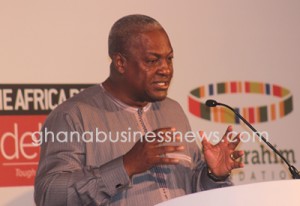 President John Mahama has argued against fast development under dictatorships as against human freedom under democracies.
President John Mahama has argued against fast development under dictatorships as against human freedom under democracies.
Citing the Libya case, he said humans highly value freedom and the happiness it brings and if it were not so, Muammar Gaddafi would still be alive.
He said: “There’s nothing more valuable to human beings than freedom and the happiness that can be found as a result of it. If that were not the case, General Gaddafi would still be alive and ruling Libya today; a country that he transformed from the poorest nation in Africa to the richest. In Gaddafi’s Libya there was free education, free utilities, free healthcare, free housing, interest-free loans. But evidently there was no actual freedom and the citizens chose the possibility of that over the stability of development under a dictatorship.”
Speaking at the opening of a debate in Accra by The Africa Report and Mo Ibrahim Foundation on the subject of whether democracy is getting in the way of development, President Mahama expressed preference for the seemingly slow pace of development under freedom and democracy, against the option of rapid “development” under authoritarian dictatorship.
President Mahama said he is “an unapologetic social democrat” who believes firmly that democracy, freedom, dignity and quality of life are integral parts of true development.
He said it was only with the narrow traditional definition of development, dwelling largely or solely on economic indicators such as industrialization and GDP, that one could say democracy is getting in the way of development.
He however conceded that authoritarian governments are sometimes able to make rapid-paced economic and infrastructural progress, mainly because there are no discussions to be had, appeals to be made, resolutions of parliament to be passed or permission to be granted.
“But are those the only things happening in countries where there is an autocrat or a dictator or a single individual who holds all the power?” he asked.
He noted that while there had been rapid development in the past under dictators such as Lee Kwan Yew of Singapore and Augusto Pinochet of Chile, their regimes were also characterized by a brutality that is difficult to ignore, in which thousands were killed, tortured or simply made to disappear.
“It is easy at first blush to be seduced by the wonders that can be, and sometimes are achieved under authoritarian regimes. The numbers from before and after are quite astonishing and dramatic so much so that one tends to overlook, minimize or altogether excuse the human rights abuses and other indignities that are suffered by citizens, in order to applaud or recommend that brand of development.”
“When I think of what our forefathers and foremothers went through to claim independence from colonial rule, when I think of all the freedom fighters who were assassinated and overthrown and exiled and when I think of the lost decades of brain drain, poverty, disease, corruption, and cruel despotism, I can’t help but wonder, progress at what price?”
The President also noted that around the world, millions of people are choosing freedom over “development” under dictatorship, fleeing authoritarian governments that wish to restrain their civil liberties.
President Mahama however said “democracy will never be a perfect system because people will always be imperfect beings” and considering the significant years of military rule, Africa has not practised enough democracy to conclude that it is ineffective.
He added that “democracy is not a one size fits all” and “every country, must through trial and error, allow its democracy to evolve into a system that is representative of that culture, those people and their stated goals for the future.”
By Emmanuel Odonkor
Copyright © 2015 by Creative Imaginations Publicity
All rights reserved. This news piece or any portion thereof may not be reproduced or used in any manner whatsoever without the express written permission of the publisher except for the use of brief quotations in reviews.
